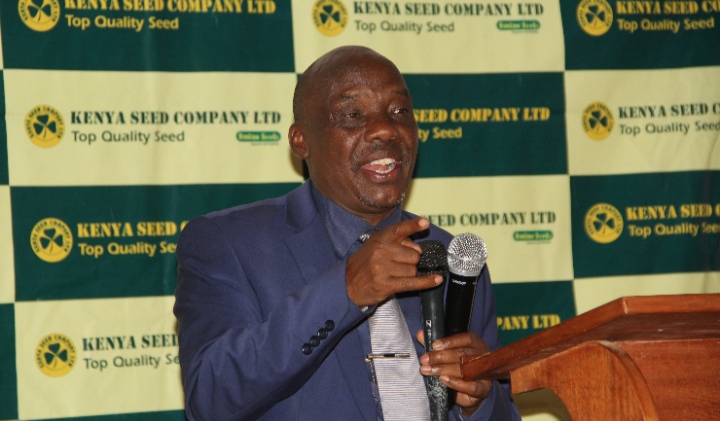Uasin Gishu,
Thursday, March 14, 2024,
KNA by Ekuwam Sylvester/Michele Kiptoo
The Principal Secretary(PS), State Department for Crop Development, Dr. Paul Rono, has called for the establishment of a seed bank and strengthening of agricultural policies, to ensure quality seed availability and at the same time, help get rid of counterfeit seeds in the country.
The PS was speaking when he presided over a consultative meeting with over a hundred seed growers in the country, sponsored by the Kenya Seed Company in Eldoret, Uasin Gishu, to deliberate on strategies, to ensure the country has enough quality seeds for the long and short rain season, to boost production, to make the country food secure. The PS indicated that the Department has realized there is a need to look at the seed system in all the value chains in the country.
Noting that agriculture is the government’s top priority agenda in terms of achieving the Bottom-Up Economic Transformation Agenda (BETA), Dr. Rono said the Ministry is following each stepM to ensure all plans and activities meant to achieve the BETA strategy is achieved on time, cost-effective and quality.
“As you are aware the government fertilizer subsidy program is on going and part of that is to ensure farmers get the right farm input in terms of seeds, so that they grow necessary food for this country and also for the foreign market,” he said.
He revealed that the seed growers need an additional 125,000 acres of land to produce 100 million kilos of maize seeds for the next year’s long and short rain seasons.
The Consultative meeting with stakeholders, seed growers and the team of experts, has come-up with a solution that there is a need to look at the Policy as a government, to deliberate on the pricing model for seed farmers to give them the most competitive prices, so that they can produce quality seeds in variety and quantity.
Noting that seed growers have been faced with challenges of land sub-division, the team agreed that there is a need to look at the idle land in government institutions to provide additional land to produce enough seeds for next year.
The PS hinted at distributing farm inputs as one package where farmers access all inputs in one depot to save them from the cost of traveling to get them from different places.
“There is a need for all of us as seed growers and the government, to have a One-Stop Shop for all farm inputs, possibly inwards and last mile distribution centres, so that when farmers collect fertilizers, they also get quality seeds from the same place,” noted Dr. Rono.
“As we continue to open last mile centres for fertilizers, we will incorporate seed inputs also, so that farmers collect all their farm inputs as one package from one place. It will reduce the cost of production and at the same time improve efficiency of distribution of farm inputs and farmers also, feel facilitated by the government,” he added.
PS put on notice people distributing fake seeds that they they will face the law.
He ordered them to immediately stop, noting that the government through KePHIS is going around to inspect and verify seeds from seed growers, and if faked the culprits would be apprehended and meet a fine of not less than a million shillings, six months imprisonment, or both.
He revealed that authorities have already arrested several individuals selling fake seeds across the country.
North Rift Economic Bloc (NOREB) Governors’ Chairperson, Governor Stephen Sang of Nandi, commended the government for its support in terms of subsidized fertilizers and quality seeds to ensure a food-secure nation.
“The whole government’s support and efforts on subsidized fertilizers and the seeds are very crucial for seed growers to ensure we have enough top-quality seeds and at a good price,” said Governor Sang.
He advised farmers to ensure they buy certified seeds, when they collect their fertilizers from national cereal board depots and last-mile distribution centres across the country, to have a bumper harvest.
Courtesy; KNA


